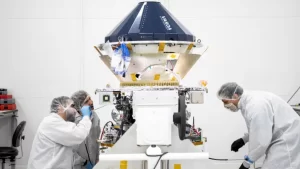
In-space manufacturing may sound like science fiction but it’s happening already, albeit on a very small scale. It’s a fledgling market that analysts and several startups are projecting will take off.
“If you look at pharma, semiconductors, beauty and health products and potentially food in the sense of like new crops, we estimated the market to be above $10 billion at some point in 2030, depending on the speed of maturation,” said Ilan Rozenkopf, a partner at McKinsey.
Space offers a unique environment for research and development because its higher levels of radiation, microgravity and near vacuumless state allows companies to come up with new manufacturing methods or materials that are not possible on Earth.
The practice is not entirely new. The International Space Station has hosted several experiments from academics, government agencies and commercial customers for things such as growing human tissue, making purer semiconductors and developing new or better drugs. In the 2024 fiscal-year budget, President Joe Biden even set aside $5 million for NASA to pursue cancer-related research on the ISS.
But access to the ISS has always been competitive and interest continues to grow. Now, several space startups see an opportunity to satisfy in-space manufacturing demand using compact space factories. One company is Varda Space Industries in Southern California. Varda’s mission is to help pharmaceutical companies improve their drugs or come up with new drug therapies by taking advantage of the unique properties of space, and then return those materials back to Earth.
Key to Varda’s business proposition is a phenomenon known as protein crystallization.
This occurs when super-saturated protein solutions are essentially evaporated to form a solid so scientists can study a protein’s structure. Understanding the crystal structure of a protein can help scientists get a better idea of disease mechanisms, identify drug targets and optimize drug design. Think drugs that have less side effects, are more effective or can withstand a greater array of conditions such as not needing to be refrigerated.
